HOME | ABOUT US | MEDIA KIT | CONTACT US | INQUIRE
HOME | ABOUT US | MEDIA KIT | CONTACT US | INQUIRE

Five years ago, Ingram’s set out to identify some of the key leadership figures in Missouri business, education, philanthropy and non-profits, arts, entertainment, sports and other sectors, and to introduce those faces to our readers.
The 50 Missourians You Should Know has produced an annual group of leaders who continue to amaze with their command of issues facing the state, with their personal stories of achievement, sometimes against enormous odds, and with inspiration and guidance that can apply to almost any business.
Now 300 strong—keep that number in mind and think of the possibilities at, say, Thermopylae—these people have taught us that leadership is engaged, not stand-offish or aloof; that success is always something to be emulated, given the multiplier effect that it has on charitable giving and community service; and that community means almost everything to these people. For these are the true pillars of communities across the state, from the sprawling farm country of northwest Missouri to its urban enclaves in Kansas City and St. Joseph, to its rows of cotton in the Bootheel.
They’ve taught us about the importance of values passed from one generation to the next. About the role of hard work, discipline and self-initiative in producing a successful career, a successful enterprise, a successful city and a successful state. And they’ve taught us that, no matter how diverse they are in background, in geography or in business sector, the story of Missouri leadership can’t be constrained to 50 people every year.
Which means, for us, we can’t wait to start compiling the 2017 roster, coming to you a year from now, and anticipating what we’ll learn from that group.
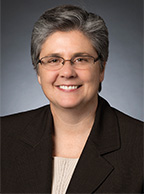 Danette Wilson
Danette WilsonBlue Cross Blue Shield of Kansas City
Danette Wilson grew up in what she calls a traditional family setting in Columbus, Neb., and a key part of that was learning the value of a strong work ethic. Good thing, too: She’s the CEO of Blue Cross Blue Shield of Kansas City, in a field that has perhaps seen more wrenching regulatory change than any other since 2010 passage of the Affordable Care Act. The ACA turned insurance models on their heads, creating three key challenges Wilson identifies: managing the uncertainty of the politics behind ACA, managing the higher costs of specialty drugs, and the big one—adjusting the risk balance of a larger, less healthy consumer base. Still, if she had the chance, “I would absolutely do it all again,” she says.
“First, I have enjoyed the challenges provided by the last few years. Second, I have a great team at Blue KC and I truly enjoy working with them. Third, I’m proud to work for a company that is the industry leader and the only not-for-profit insurer in the Kansas City area.” With priorities that differ from those of for-profit insurers, Wilson says, “we are able to make decisions in the best interest of our members and community.”
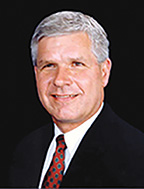 Barry Orscheln
Barry OrschelnOrscheln Farm & Home
Moberly
Barry Orscheln goes full self-deprecation when assessing a family business legacy that starts in Moberly and runs around the world: “I’m third generation,” he says, citing an oft-used business maxim, “so I’m the one supposed to screw it all up.” Far from it: The company started by Orscheln brothers in his grandfather’s generation is a fixture in Missouri for its farm and home supply stores, yes. But its only one of a dozen companies, partnerships and joint ventures that employ 3,000 people worldwide. “When you go back to that first generation, they were entrepreneurs,” Orscheln says, describing traits the company still embraces today. “If you look today at almost every business we’re involved in, we started them from scratch. We’re proud to be called entrepreneurs.” Digging deep for talent, and treating them right has produced a rare level of employee loyalty—the last time one of his direct reports left for greener pastures was 20 years ago, Orscheln says. Another key value is philanthropy, as well is key, investing in communities where the company succeeds.
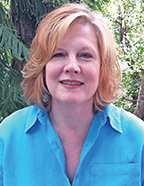 Patricia Hagen
Patricia HagenT-Rex Center
St. Louis
It has nothing to do with paleontology, and everything to do with the future: The T-Rex Innovation Center in St. Louis is home to 150 fledgling business, and if Patricia Hagen’s vision is realized, that number will double with renovation of the Downtown St. Louis building it now calls home. Since it started in 2011, says its executive director, “T-REX-based companies have created hundreds of jobs—over 200 jobs have been created by T-REX graduates in Downtown alone,” thanks to critical collaborations across non-profit, entrepreneurial support groups, and venture capital and accelerator organizations. She brings a background in both academic research—she was a vice provost for research at Saint Louis University—and non-profit work, having held various leadership positions with the Audubon Society at the state and national levels. That history, she says, “gives me a good sense of how building strong partnerships with public partners can help us to reach the goals that we have. I tell people that this work is about St. Louis, and how we can grow jobs and increase economic development for everyone in our region.”
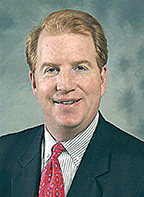 Bryan Cook
Bryan CookCentral Bancompany
St. Louis
For 111 years, a Cook has been at the helm of what’s now Jefferson City-based Central Bancompany, a family banking legacy deeply bound into the fabric of the state’s own history.
The man at the helm is president and CEO Bryan Cook, the fourth generation of that family to lead the bank. His great-grandfather was primarily responsible for organizing efforts to keep Jefferson City as the state capital after a lightning strike torched the Capitol building in 1911.
Bryan Cook became president in 1990, during a time when bank operations were faltering, and soon had it back on a growth track. Cook himself, growing up in the bank, worked virtually every position on the way up, as did previous generations before him.
It grew from comparatively humble beginnings that year, about $246 million in assets, to more than $11.5 billion today—an average of better than $432 million a year, every year, for 26 years, and is now the state’s third-largest bank holding company, trailing only Commerce and UMB Bank, and more than twice the size of Number 4 First Banks, Inc.
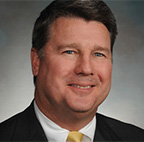 John Wanamaker
John WanamakerBKD
Springfield
In accounting, at least, it does take one to know one: John Wanamaker’s high school days were influenced by the CPA who lived next door, so he took bookkeeping class at Kickapoo High School, and he was on his way. Working full-time while earning cum-laude honors from Missouri State University, he secured his accounting degree and had looks from Peat Marwick (now part of KPMG), a small firm in town, and BKD, which won out. There, he found a cultural fit grounded in service, high standards and a corporate mission that aligned with its talent. His first year in the audit practice exposed him to banking, real estate, grocery, manufacturing and distribution, home care and other industries. Health care, he said, had a special appeal, “specifically with home care, hospice, outpatient rehab agencies and long-term care facilities.” He rose to managing partner in 2004, and has a rare perspective on the state’s business attributes, such as low cost of doing business, tax rate structure, wage base, utility costs and a generally pro-business state government, plus educational assets that contribute to a solid work force.
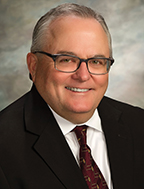 Pat Dillon
Pat DillonMosaic Life Care
St. Joseph
Pat Dillon is a St. Joseph native who spent 25 years running an insulation business that had been started there by his father. Along the way, something funny happened. “As the business grew, I was very active in things like United Way, the chamber—I loved that whole ability to run a business and help your community,” Dillon says.
So when he sold the insulation business in 2007, he didn’t have to go looking for a new career—it found him. His past community service included a stint on the board of Heartland Health, now Mosaic Life Care, as its small-business representative. “The chief operating officer said they had this new push for health-care retail—anything from on-site shops to mini retail clinics like in Walmart—and asked if I’d be interested in being involved.” He was, and he now leads Mosaic’s system outreach and government-relations efforts. “I tell kids and others, those doors get opened by involving yourself in your community,” he says. “No way could I have—would I have—applied in the hospital world without those six years on the board. Opportunities present themselves when you put yourself out there like that.”
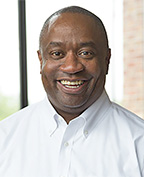 Mark Garrett
Mark GarrettSmithfield Foods
Kansas City
The appeal of human-resources administration, on a personal level, was that it afforded Mark Garrett a certain career flexibility. On a professional level, he has found success through a blend of his own hard work and a Missouri talent pool that makes his job easier. “Our people are hard-working, come from some the best regional and national universities and compan-ies, and are philanthropic,” Garrett says. “The Midwest work ethic is second to none!”
A product of the Center School District, Garrett earned his business degree from KU, then jumped into a series of HR roles, first at Hallmark, then Farmland Foods, which is now part of the Smithfield organization, a $13 billion meat and pork-products processor. His job, he says, “gives me the ability to help influence business outcomes by the recruitment and retention of high-caliber employees.” He sees rich opportunities for the state to enhance its food-production potential in an era of increasing global demand. “We have many large food companies in the region that work with local farmers to provide high-quality products to our consumers,” Garrett says.
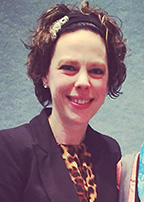 Jennifer Labit
Jennifer LabitCotton Babies
Fenton
The inspiration for her company? “We had to eat,” Jennifer Labit says concisely. After becoming unemployed by the dot-com bust in 2000, she and her husband, Jimmy, had $30 a week after the rent, utilities and other basic expenses were paid. “When you have a baby and you buy diapers, that doesn’t cover a lot,” Labit says. With a $100 investment, she started selling baby slings in 2002, tucking 10 business cards into each. Then her phone started to ring. “It was,” she says, “social media before there was social media.” Her passion for helping others in her situation—studies show that one-third of parents must choose between disposable diapers and food or other basics—soon led to the cloth diaper line, and today, Cotton Babies employs about 60 people and has expanded into baby carriers, feeding gear, toys, clothing and maternity products and more. She also founded the Cloth Diaper Bank, with a goal of covering the U.S. with sites to provide diapers for families in need. It’s been an incredible and unexpected journey, but “you do the best with what’s in front of you,” Labit says. “Life’s biggest changes are often tied back to something simple like this.”
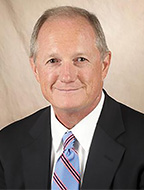 Don Downing
Don DowningGray Ritter & Graham
St. Louis
Few Missourians have a Don Downing appreciation of the state: Born in the bootheel, educated at MU in Columbia, practiced law in both Kansas City and St. Louis. Today, he’s managing partner for the Gray Ritter & Graham firm, but everywhere he’s been, he says, there’s been a common thread. “The values instilled here are ones that all Missourians share: hard work, honesty, a Missouri common sense. You find that all over the state.”Drawn to public life his father’s service in the Missouri House, Downing started working for politicians as a youth. As a sophomore in college, he worked for Jerry Litton’s U.S. Senate campaign, and “cried like a baby” the night Litton died in a plane crash. “I thought he could have been president,” Downing says. Law school—and distaste for the fund-raising demands of political life—made him rethink public service.
Downing is a heavily engaged in civic causes for St. Louis and the state, having served on a long list of boards, including six years on the board of curators for Mizzou, one of his favorite causes. “It’s the old adage, to those who have been given,” he says, “much is expected.”
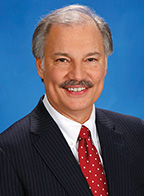 Steven Bjelich
Steven BjelichSt. Francis Health
Cape Girardeau
Steven Bjelich was a Big Ten-champion track athlete at Indiana, and what he learned there stayed with him long afterward: “Focus. Never stop. Look critically to improve everything you do. Even if you think something is really good, look harder and make it better,” says the CEO at St. Francis Health System. “The lessons I learned in athletics carry over as lessons in leadership.” A native of Griffith, Ind., he was drawn to medicine in roundabout fashion: Noted heart surgeon Michael DeBakey treated Bjelich’s father, and would talk about the need to apply solid business sense to the compassion in health care. “The appeal of health care—of helping people at sometimes the most difficult times—was strong to me,” Bjelich said, and his analytical side led to a double major in marketing and finance, then a master’s in health-care administration. “Regrettably, our region ranks very high in cancer, heart disease, diabetes and low-weight babies,” Bjelich says. “There probably isn’t another industry with the complexities of health-care finance,” he says. “It was an excellent education track for me, and a great career choice.”
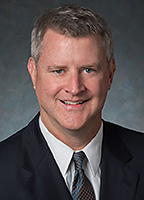 Jeff Simon
Jeff SimonHusch Blackwell
Kansas City
Yes, he’s a Missouri guy, a son of St. Louis who leads a big law-firm office in Kansas City. But the real measure of Jeff Simon as a man is that he can comfortably wear Royal blue in public, and admit that his adopted home is the barbecue capital of this state. Do not, however, get him started on Italian restaurants or the designated-hitter rule.
Simon is managing partner for Husch Blackwell, one of the region’s five biggest law firms, and one specializing in nearly every stripe of business law. He came here out of law school at MU—he married just 10 days after taking the bar exam—and both Simons quickly fell in love with their adopted town, with a special assist from the late Harry Wiggins. He was a neighbor who made it his mission to see that the young couple would be enamored with the place.
After a two-year stint working for Judge Howard Sachs, Simon returned to St. Louis following his father’s death, but realized something important was left behind. “The way of living here, for me, the way the legal community conducted itself, the way the courts and lawyers got along, it was just a more pleasant place to practice law,” he says.
 Dave Young
Dave YoungThe Sound Room
Chesterfield
OK, so his musical skills wouldn’t make David Young a rock star. But his love of high-quality sound has made him, and his Chesterfield company, rock stars of home entertainment systems. After several years in that field, he founded his own company in 1983—a year that happily coincided with introduction of the digital CD. “It was a transformational product,” he says, “and we were the first company in the market with a CD player.”
It cost about $1,200 in 1983 dollars (twice that today), but the sound was amazing, and being first to market was a huge leg up for his new business. He followed that up by having the region’s first component hi-fi home theater system, and solidified the company’s reputation in the St. Louis area, and it has expanded into home security and digtal operating systems.
The Sound Room was cited by Twice magazine, two times, as the nation’s best specialty audio-visual retailer, and the company is an annual fixture in CE Pro’s Top 100 list of system integrators. “You wouldn’t recognize the business today” from its early years, Young says. “Today, we’re a tech company, and everything we do is networked.”
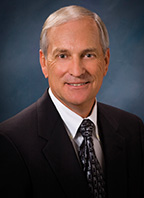 David Murray
David MurrayR.B. Murray Co.
Springfield
Springfield is on a winning streak, and Dave Murray has had a front-row seat for much of that civic progress. The president of R.B. Murray Co., a commercial realty firm, counts the ways: “There has been a transition from heavy manufacturing toward medical, retail, entertainment, distribution, education, re-manufacturing and service industries,” he says. From the economic might and philanthropic power generated by companies like Bass Pro Shops and O’Reilly Auto Parts, from growth at Missouri State and Ozarks Technical College, growth has pushed the region’s population past 452,000, and counting. “The fun part of my business,” says Murray, “is that I have had the pleasure of working with many of the companies that have driven our growth.”
His family is old-line Springfield, having settled there before 1900, and the Murray name is attached to successful ventures in construction, retail grocery, hardware, insurance, banking and, in his case, commercial realty. The 107-year-old firm is among the three oldest locally owned companies in the city.
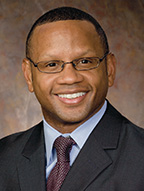 Rodney Boyd
Rodney BoydDentons
St. Louis
Rodney Boyd works in the public policy and regulation practice at one of the world’s biggest law firms, but he’s seen seamier aspects of the law first-hand. This successful and highly visible partner with Dentons’ is also a former city prosecutor—an experience, he says, that “taught me so much about our criminal justice system and how the system impacted the lives of everyday citizens. I was overwhelmed by the number of people who had the municipal court system as the only contact with their government.” From that, he drew enlightenment about the challenges facing his home town, which in turn, he says, “gave me a real appetite for public policy.” He attended Lincoln University, studying criminal justice, and MU for his law degree. After college, he was a legislative aide in the General Assembly and clerk for the Supreme Court before becoming a prosecutor. As chief governmental relations adviser for the city, he’s helped Mayor Francis Slay create a St. Louis Renaissance. “I have been fortunate,” he says, “to work with the mayor’s administration over the last 14 years to help advance economic policies to continue to move St. Louis City and the region forward.”
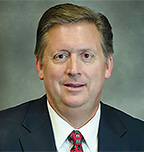 Dave Liechti
Dave LiechtiLiechti Franken & Young
St. Joseph
Dave Liechti was all set: Job with a major accounting firm, married to his high school sweetheart, starting his career in Tulsa. But family ties and hometown St. Joseph proved irresistible, so back they moved. A few years later, he decided it was time to start his own accounting firm. “I was pretty young and didn’t know any better,” Liechti laughs. “I had one child, my wife was pregnant, I started the practice with a four-year lease and no health insurance. It was … interesting.” Still, he says, “it was a great decision.”
And not just for himself. While he’s gone on to build a successful practice, Liechti has also compiled an impressive resume of service, especially with education-related causes: Local school board for six years, service on the governor’s P-20 council, and eight years on the state board of education. And after that, appointment to Missouri Western State University’s board of governors.
What mattered most? Defending academic stand-ards while on the state board, Liechti says. “Some thought we were too strict at one time, but I’m most proud that we stood by the notion that if you expect more from kids, you get more.”
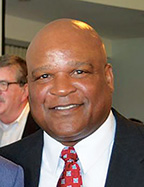 Deron Cherry
Deron CherryUnited Beverage
Kansas City
He’s considered one of the best free safeties to ever play pro football, but Deron Cherry’s introduction to Kansas City and the Chiefs came when he signed a free-agent contract as . . . a punter. The product of Rutgers University never kicked in an NFL game, but he certainly left his mark: a six-time Pro Bowl selection, six 100-tackle seasons, and 53 career interceptions in 11 seasons. And when he was done, he made Kansas City his home and started looking for other fields to conquer. Four years after the 1991 season, his last, Cherry was part of an ownership group that secured a prized NFL expansion team, the Jacksonville Jaguars, which were later sold to Pakistani-American billionaire Shahid Khan. Cherry also bought United Beverage, the Kansas City distributor of Budweiser beer. Now, he’s turned his attention to another competitive venue, as part of the development group for Gateway Village, a $300 million mixed-use development in Grandview that would have as its anchor a sprawling sports complex in southern Jackson County. And it’s not just any soccer complex: with 15 turf soccer fields, it would be the largest all-turf complex in the world.
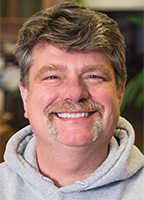 Jeff Schrag
Jeff SchragMother’s Brewery
Springfield
Jeff Schrag is, among other things, founder and self-described carouser-in-chief of Mother’s Brewery, maker of hand-crafted beers. But he didn’t build just a brewery—it’s a time machine. “I see this as a return to the way people bought goods and services for thousands of years,” he says. “I think that mass production, especially of our food and drink, is the anomaly. I am happy that Americans are re-embracing a culture that knows who grew and processed their food.” Schrag has been doing just that in Springfield, the town he adopted more than 20 years ago after moving from his native Kansas, and one where he’s had multiple successes in business. Still, he says, “I never saw myself as an entrepreneur, just as a guy who was looking for the next opportunity.” Or, perhaps, the guy who had too many folks on the payroll, so instead of letting them go, he’d buy another business and apply the excess labor there. In 2008, he read a timely article about the resurgence of craft brewing, and it was game-on. “The notion that I could brew as good a beer as anyone, anywhere and brew right here in Downtown Springfield,” he says, “that was the golden moment in my journey.”
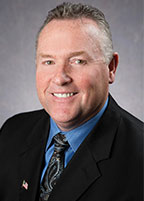 Mark Fenner
Mark FennerMFA Oil
Columbia
When it comes to business structures, there’s nothing quite like a cooperative. Just ask Mark Fenner. “I love the cooperative system,” says the CEO of MFA Oil. “It has endured decades for us, and over a century for many co-ops.” The advantage, he said, is that the users of coops, in his case, farmers, are also the owners. “Our governance is led by elected farmers, who are concerned for the long-term results, not a short-term stock-price scenario,” he says. And in rural communities, trust and compassion are important parts of daily life: “For us, while the bottom line is very important, it’s not the only thing we worry about.”
A Richmond native who played football at Missouri Western he moved on to Missouri to earn a degree in agricultural economics. He’s worked in the energy operations of Farmland Industries and Minnesota-based CHS, and came to MFA Oil in 2012, bringing some fresh thinking and ideas, and the needs fit his skill set. He’s grateful to have found a company looking not just for rapid growth, but to maintain its philanthropic history. “I’m very blessed to work here and honestly feel the good Lord wanted me here,” he says.
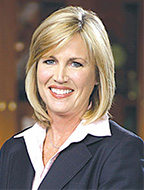 Pam Nicholson
Pam NicholsonEnterprise Holdings
St. Louis
She was a hometown girl, from Homestate U., starting her career with a hometown company as a management trainee. Of course, in those days at Enterprise Rent-a-Car, that title meant you were as well-acquainted with a car vacuum as you are a scheduling document. But 35 years later, Pam Nicholson has achieved things no other woman can lay claim to: She’s the CEO of Enterprise Holdings, the world’s largest car-rental company and she’s the first woman outside the founding Taylor family to run the organization. She’s also a routine fixture on the Fortune 50 list of the most powerful women in business, hitting No. 36 on the worldwide list. That’s a long way from washing cars for an MU graduate holding a degree in economics. She now runs a company that owns not just the Enterprise brand, but Alamo Rent A Car and National Car Rental’s operations, as well. All told, Nicholson is in charge of more than 9,000 neighborhood and airport locations in more than 70 countries, and more than 91,000 employees. Those companies, and various other transportation-related subisiaries, generated $19.4 billion in revenue in 2015.
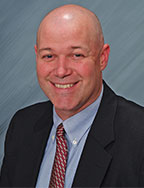 Mark Lear
Mark LearTravelers Insurance
St. Louis
At most every juncture of Mark Lear’s life, he’s been able to embrace the value of leadership: On his way to becoming an Eagle Scout or leading a church youth group in his native Galesburg, Ill.; as an regular Army and National Guard officer; as midwest regional vice president for Travelers, and current board president for the USO of Missouri. “The strength of the USO of Missouri drew me to the organization,” Lear says, “but the appeal of board leadership and service will always be personal.” Why? Cut off from family while serving in Afghanistan on Christmas Eve 2006, he remembers, “the USO lifted my spirits on that trying day.” His board leadership, then, “simply pays them back for the gift they gave me: A home away from home and family.”
His military career started while he was studying toward the degree in business administration he earned from Eastern Illinois, and it prepared him, he says, for success in business by teaching that mission success is critical, that team needs take priority over personal ones, that leading by example inspires trust, and those you lead “will always be the most critical element to mission success.”
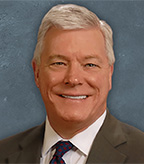 Peter Kinder
Peter KinderLieutenant Governor
Jefferson City
Before he became Mis-souri’s lieutenant gover-nor, with a goal of shortening that title the Governor this year, Peter Kinder worked as a lawyer, as a real-estate development specialist, and as a newspaper publisher and columnist. Those roles, he says, help frame his perspective of Missouri’s needs as an office-holder and give him “unique insight into the difficulties facing Missourians,” he says.
He’s an eighth-gener-ation Southeast Missourian who proudly proclaims the values inherited from Generation 7: hard work, obeying the law, caring for the needy, and using basic common sense. He also learned how to tie those values to political campaigning, working for Sen. Jack Danforth in 1972, then managing Rep. Bill Emerson’s congressional campaign in 1980. Missouri, he says, with two big-city markets straddling lots of rural constituents is a diverse business environment that must boost its agribusiness, secure more export markets and support its research institutions. “The primary role of the state government in business should be to foster and grow a welcoming climate where businesses can succeed,” Kinder says.
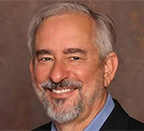 Gary Kremer
Gary KremerState Historical Society
Columbia
Coming out of the small Catholic farming community of Frankenstein, Mo.—yes—Gary Kremer pondered a career as a social worker. His education at Lincoln University, as a white student at a historically black college, made him rethink a subject he’d always hated—history. “It became for me a way of understanding, particularly the Vietnam war and civil-rights movement,” he says. “I started reading it on my own as way of understanding, and I got hooked.” That hook set even deeper during his fellowship at American University in Washington, where he earned his Ph.D. and had a nearly front-row seat for the Watergate hearings in 1973. Today, Kremer is director of the state’s historical society, a fifth-generation Missourian who would like to see more residents broaden and deepen their own understanding of how the state’s history still affects our lives. The society has secured a $35 million bond issue to construct a new building, creating a Center for Missouri Studies, “and what we hope will become, a place where we can grapple with the issue of what it means to be Missouri and how that meaning has changed over time,” Kremer says.
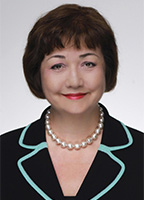 Anna Crosslin
Anna CrosslinInternational
Institute of St. Louis
Nearly 40 years after the International Institute of St. Louis, in Anna Crosslin’s words, “took a chance on me,” she has amassed dozens of awards for advancing the interests of immigrants and promoting cross-cultural understanding. Last summer, she was at the White House, being recognized for her work with refugees. She was just six years out of Washington University, working as an administrative secretary there, when the institute’s leadership role came open. “But I had learned to write grants under the tutelage of a famous and highly entrepreneurial Sinologist (Prof. Stanley Spector), and the Institute board sensed that there were going to be opportunities to grow the organization.” And how: From a staff of nine and an annual budget of $110,000, it has grown into a highly influential organization with 90 employees and a budget of $6.2 million. “Every five years, the business changed so much that it felt like I had moved on to a new job!” she marvels. The anti-immigrant sentiment she fights is nothing new: “If you think the tone is nasty now,” she says, “go back and read some of the congressional material during the early 1920s.”
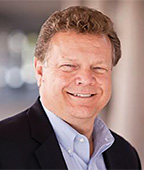 Mike McCurry
Mike McCurryMercy Health
St. Louis
Growing up around his father’s automotive products distribution company, Mike McCurry was always fascinated by the way business operates and grows—Walmart, in fact, was one of that company’s customers, and not even its biggest in those days. No surprise, then, that McCurry would earn a business administration degree before starting his own career. But he took it in a different direction, thanks in part to the passion he saw in his wife and her nursing job. Today, he’s chief operations officer for Mercy Health, where he applies those business skills to what those in the health system call “the struggle,” the never-ending battle to balance cost, care and compassion in treating patients. After seeing first-hand the efforts that doctors, nurses and staff put into saving a dying boy one night and comfort his family, “I thought that if I can find a way to make their lives easier around the non-health-care stuff, so they could do more of what I’d just witnessed, that would be a great calling.”
Five generations of his family have called southwest Missouri home, and McCurry still has a home there, too, getting back as time avails from work in the big city.
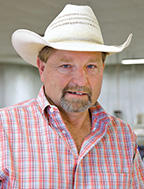 Jackie Moore
Jackie MooreJoplin Regional Stockyards
To be a cattleman in Missouri, says Jackie Moore, is to understand challenge. “It’s hard to starve a cattleman,” says the owner of the nation’s second-largest livestock auction. “He’ll live as poor as he needs to to survive. He’d sooner trade his wife than his cows.” Things have been tough on ranchers in recent years, given the drought-induced herd reductions and high costs of feed to maintain what’s left. But, as with the rancher, you can’t beat the optimism out of this Scott City native. “The health of the sector in Missouri is still in great shape,” he says. “We have good organizations we get support from, and there are local people who take an interest in the cattle industry and give up a lot of time and their own money to make it successful.” His operation sold about 415,000 head last year, down from an average of 450,000, but he’s confident that ranching is rebounding. The business, he says, has always run near break-even. “These are people who love the land, love the cattle, and love the business—that’s always been what’s kept producers out there, doing what we do,” he says. “It’s hard to explain that unless you’re one of them people.”
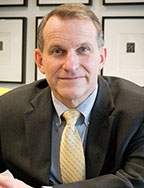 Mark Fitzpatrick
Mark FitzpatrickMissouri Bank & Trust
Kansas City
You might not know Mark Fitzpatrick, but if you’re into Big 12 basketball, you may have heard him: This committed sports nut, a banker by day, has served as PA announcer for the Big 12’s tournament at Sprint Center, and he was an official scorer for MU baseball in 1980, and he has worked the scoreboard at Kauffman Stadium.
Omaha-born but raised in Kansas City from age 4, Fitzpatrick says “I had a real normal, happy childhood, became a big sports fan at a very young age and tried to play all of the sports—though none of them very well.”
He’s a Rockhurst High and Mizzou journalism graduate who worked in sports information for three years, first at Stanford University, then back in Columbia, where he decided to get an MBA. “Mark Twain Bank made me the best offer, so I became a banker,” he says. The best part about that? “Working with so many different businesses,” says Fitzpatrick, who oversees commercial loans for Missouri Bank & Trust. “I have had the opportunity to work with people in a wide variety of industries and it’s been great to share in their successes.”
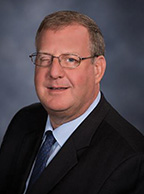 Tom Waters
Tom WatersWaters Farm
Orrick
Strategic planning, accurate accounting, data-record keeping, forecasting, monitoring, GPS tech-nology—all are essential to this modern business: Waters Farm, where a seventh gen-eration is at work in ways that would dazzle the fifth. “Our number of acres has increased and the size of our equipment has grown,” says Tom Waters. “My grandfather hired several employees to operate the farm; today, I farm many more acres with only one full-time employee and one or two part-time employees during spring planting and fall harvesting.” And modern farming, he says “is a combination of a lifestyle and a business.” Responsibility of managing a family farm, he says, entails planning for the transition from one generation to the next, and is no simple task: “I spend lots of time thinking about the future and those following in my footsteps.” Part of that is committing time to serving on the state’s highways and transportation commission. That work, Waters says, “has opened my eyes to the incredible challenges the state faces” in protecting its commercial, industrial and agricultural bases by maintaining its high-way and river conditions.
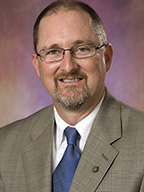 Greg Burris
Greg BurrisCity of Springfield
Springfield-born and Nixa-raised, Greg Burris would graduate near the top of his class in computer-information systems, at a time when IT professionals were in peak demand. “I had lots of opportunities to go work for various companies,” he recalls, but his alma mater, Missouri State, offered an entry-level job. The pay was decidedly lower, “but something about the idea of working at a university strongly appealed to me,” he says. Reflecting on classmates who made fortunes by starting a medical software company, he muses, “no one gets rich in public service, but I followed my heart.” That heart kept him at his alma mater for 25 years, and he rose to vice president for administrative and information services. In 2008, he become Springfield’s 12th city manager, bringing a unique perspective on the ties between community and university. Citing a quote from former MSU president John Keiser, Burris said, “There’s never been a great university without a great city, and there’s never been a great city without a great university. Having worked on both sides of that equation, I’m more convinced than ever that he’s right.”
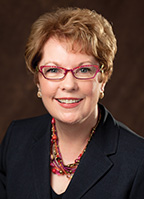 Elizabeth Stroble
Elizabeth StrobleWebster University
St. Louis
It’s hard to imagine a bigger advocate for private colleges in Missouri than Elizabeth Stroble, president of Webster University since 2009. The numbers come with ease: Private colleges, she says, “enroll more than 35 percent of all Missouri students; they award 46 percent of all bachelor’s degrees and 65 percent of master’s degrees.” Their students typically graduate faster, too—at zero cost to the state in terms of operating or capital dollars, she notes. Four-year graduation rates, minority graduation rates—there are ample reasons to feel bullish about what’s going on with private colleges today.
The first in her family to finish college, she came to Webster in 2009, drawn by its global perspective and the pioneering spirit of Webster’s founders, the Sisters of Loretto. Born in Wyoming and raised in Chicago, she earned her doctorate at the University of Virginia, with career stops in Arizona, Kentucky, Ohio and Kansas. “I relish opportunities for new learning, building relationships with new friends and colleagues,” she says, “and I seek to make a difference by removing barriers to success for stu-dents and communities.”
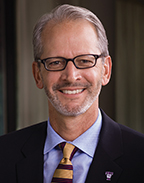 Troy Paino
Troy PainoTruman State University
Kirksville
If anyone knows the value of education, it’s the president of a state university in a small-town setting. Often, they are the vital cogs in a town’s economic engine, and Truman State is no exception. And its president, Troy Paino, is all about education. In his own case, it started with a dual bachelor’s degree from Evangel University in Springfield, in history and philosophy. Then he picked up his master’s in American studies at Michigan State, where he also snagged a Ph.D. in that field. It didn’t stop there: Paino went on to earn his law degree from the University of Indiana, then spent three years in private practice before going back to a campus. He’s been a teacher and scholar, researching and writing about higher educa-tion in the U.S., 20th-century cultural and social history, American legal history and the history of U.S. sport. Before coming to Truman State in 2008, he was dean of the college of liberal arts at Winona State University in Minnesota. His first role in Kirksville was provost and vice president for academic affairs, and two years later, succeeded Darrell Krueger as president, but still holds academic rank as professor of history there.
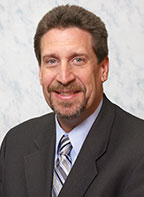 John Mehner
John MehnerCape Girardeau
Chamber of Commerce
John Mehner earned his degree in criminal justice, then signed on as a police officer in St. Louis for four years. Then he took a new turn in life by going back to his roots: His father’s office equipment and communications business in Cape Girardeau, a business he’d grown up around.
He soon realized that when you’re in business, you’re never in it alone. “I started volunteering with the Chamber,” he recalls, then served on several committees, was elected to its board, and became chairman in 1991. “I fell in love with the organization and the work it does,” he says. When the position of president and
CEO opened up in 1993, he went after it, and won.
“The Chamber business, like so many others, is all about relationships,” Mehner says. “I think the biggest advances made in the community to improve the overall business climate are centered on relationships.” That means developing new ones, building on old ones and mending broken ones, and he did a lot of each in the past 23 years. “And all these successes,” he says, “apply to local, state, national, and international relationships.”
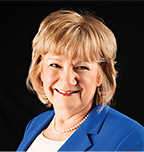 Sharon Cornelius
Sharon CorneliusAgri-Business Expo
Center, St. Joseph
Whether you’re on a farm, a ranch or a dairy operation, Sharon Cornelius says, “you’re working toward something bigger than yourself.” She knows that as a fifth-generation farmer who married into a fourth-generation dairy operation. From her childhood days weeding rows of soybeans in the summer heat of northwest Missouri, she learned “dedication, hard work and perseverance when things are not going your way.” At her father’s urging, she learned bookkeeping, and her understanding of the ag business side positioned her to become the first CEO of the Agri-Business Expo Center, a non-profit formed to realize a 50-year-old dream of 4-H students in the region. The center has raised funds for a commercial development plan on a 145-acre site near St. Joseph. The goal is a center not just for farm shows, but for work-force development, classroom instruction and meeting space. It even sec-ured a $4 million state grant to build an interchange on U.S. 36, money that had to be guaranteed should job-creation targets fall short. “I’m so proud of this community,” she says. “It shows how hungry this region is for growth.”
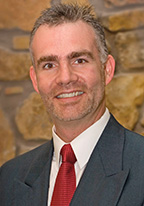 John Motazedi
John MotazediSNC Squared
Joplin
Joplin will never regain what it lost in the 2011 tornado—but it need not live in the wreckage of that past, says John Motazedi. Owners of some longstanding businesses took the insurance money and never re-opened, says the CEO of SNC Squared, which provides IT services for small and mid-size businesses, especially in health care and manufacturing. Others, like his, though torn both physically and psychically, “were committed to the community. We built back in the same location as before and planned on making it bigger and better than it ever was.” Those companies, and even the town itself, dispensed with old ways of doing things and embraced new ideas, new perspectives, he says. “We lost our building, along with 50 percent of our client base,” he says, but the other half still needed to conduct business. “How do you balance when a client has lost everything and another still needs to operate to the benefit of the community?” Motazedi asks. A lot of 16- and 18-hour days followed, but his company, like so many others, emerged stronger for it. “Joplin,” he says, “ is a clean canvas with significant potential for new growth.
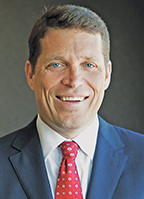 Todd Graves
Todd GravesGraves Garrett
Kansas City
Persistence. It’s wired into the DNA of anyone who’s part of a multigenerational farming family, and it carries over for those who go on to other sectors. Case in point: Todd Graves. The former federal prosecutor is now in private practice in Kansas City, but still lives on a spread of farmland that has been in the family for 149 years. “On the farm and in the practice of law, often you can sit around and think about what’s the best way of doing something, or you can get started and just do it,” he says. ” He grew up near Tarkio, a kid who loved reading and had an aptitude for social studies, history and government. The law didn’t appeal to him then “because I didn’t like to write,” he says, but after a bout with lymphoma in college, farming took second place, and owning a small legal practice fit neatly into his value set. “Being a small-town farm kid is kind of an entrepreneurial upbringing,” he said. “My parents worked for themselves, my mother worked at home on the farm, and even though I practice law, it’s my own firm and I’m still active in farming operations.” A side benefit, he cracks, is that with legal work, “I get to sit inside when it’s below freezing out there.”
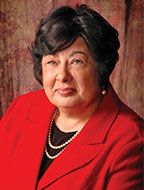 Carol Silvey
Carol SilveyCommunity Foundation of the Ozarks
West Plains
Carol Silvey graduated high school at 15 and college at 19, so there really never was much question about her ability to get things done. In a 37-year career at the West Plains campus of Missouri State University, she taught history and helped a generation of students learn how to just get through college, and spent 17 of those years building the campus’ first development office.
Time to retire, right? Not quite. Then-president Gary Funk, of the Com-munity Foundation of the Ozarks, approached and asked if she’d ever thought about doing something else. And that, she says, is how a second career was born, working in the foundation’s West Plains office as senior associate for advancement, helping other non-profit leaders learn the skills to become more effective. It was the right fit, at the right time.
“I always loved the small towns,” she says. “Not to be a big duck in the small puddle, but building relationships here. The poverty rate is significant; this is one of the poorest areas of the U.S., and there’s a lot of need. But with the relationships, you can see the difference that one individual can make.”
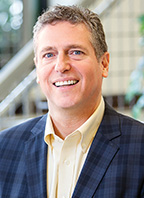 Donn Rubin
Donn RubinBioSTL
St. Louis
He experienced a bit of wanderlust—geographic and professional—after earning degrees at Penn’s Wharton School (in economics) and Michigan (in law). Then, Donn Rubin says, he followed “my desire to have a positive impact in the world on a path of volunteerism and not-for-profit work that continues to this day.” He spent much of the 1990s in Albania in various roles, including helping advise drafting of a constitution. He also assisted with efforts to improve health-care systems in nine other former Soviet satellites. In 1999, he came back to his hometown and worked with former Sen. Jack Danforth for two years, then landed a “temporary” role with a new regional initiative to grow the biosciences, led by Danforth’s older brother, William. “As it has turned out, the project has extended for 15 years and is going strong,” says Rubin, president and CEO of BioSTL. “When we started our work 15 years ago,” he says, “there was no infrastructure to support startups.” Today, he says, “entrepreneurship is flourishing and we are developing a critical mass of exciting companies and innovations that are undoubtedly building a strong reputation for our region.”
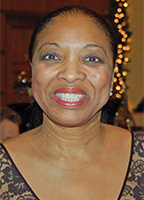 Millie Edwards Nottingham
Millie Edwards NottinghamSinger
Kansas City
Millie Edwards is a well-known singer in Kansas City and beyond. Millie Nottingham is a comprehensive literacy instructor at Penn Valley Community College. When the lights go off at the office for Nottingham, and come up on stage for Edwards, she nurtures a love of music that never went away. “After college, I went on the road for two years—and I realized I didn’t want to be a professional musician,” says Edwards, an Independence native who minored in music at Ottawa University, and majored in education. “I wanted a job with benefits and a long career.” She found both as an operator at Southwestern Bell, then with AT&T after the 1984 divestiture, and served in various functions, including community representative and working with non-profits like the United Way. But music, she says, has always been a part of her life, going back to piano lessons at age 4. For most of the past 35 years, she’s filled her weekends—and no small number of week-nights—with mic in hand on stages across America, working with some of the best-known names in jazz and contemporary music.
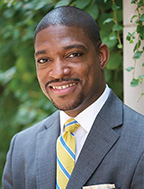 Starsky Wilson
Starsky WilsonDeaconnes Foundation
St. Louis
Raised in Dallas by a single mother, Starsky Wilson learned to treasure family and faith, but he also learned about loss: His older brother and youngest uncle were both lost to gun violence while Wilson was in high school. “This has had a major influence on my journey,” says Wilson, who says he began to discern a call to ministry while attending Xavier University. He entered the seminary in 2006, and assumed leadership of Saint John’s Church (The Beloved Community) in St. Louis in 2008. He also became president and CEO of the Deaconess Foundation, a faith-based grant-making entity linked to the United Church of Christ. Commitment to St. Louis, a background in non-profit management and his role as minister made him the pick for that role in 2011. He’s won numerous awards for service in the St. Louis area, but his biggest challenge may have come when Gov. Jay Nixon named him to lead the commission studying the Ferguson riots of 2014. His hope is that its report, “Forward Through Ferguson: A Path Toward Racial Equity,” will be read by every elected official to seek solutions to longstanding social ills.
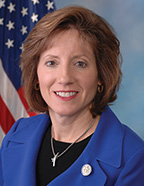 Vicky Hartzler
Vicky HartzlerU.S. House, 6th District
Harrisonville
In terms of an unlikely ascendance into public life, Vicky Hartzler’s story isn’t quite the Hollywood version of “Mr. Smith Goes to Washington.” But it’s not far off, either. Her first taste of public life came in 1994, after teaching high school home economics for 11 years, and she served three terms there before returning to private life in 2000.
But a decade later, she answered the call by taking on a legendary figure in Missouri’s congressional circles—the venerable Ike Skelton, who had represented the 4th District in the U.S. House for 34 years.
It was close; Hartzler picked up a strong tailwind from the 2010 GOP wave that rocked Capitol Hill, and her 50.4 percent of the vote was enough to send Skelton into retirement. Not since 1955 had 4th-district voters sent a Republican to Congress, and she was only the second from that party to earn that distinction since the Great Depression.
She was raised on a farm near Archie, in southern Cass County, and when she’s not in session in D.C., she’s back on the farm she and her husband operate not far away, near Harrisonville.
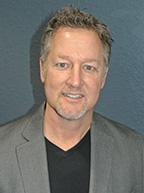 Greg Surdyke
Greg SurdykeSurdyke Yamaha
Osage Beach
The Surdyke name has a long history in St. Louis vehicle sales, and Greg Surdyke did his part there as a youth by sweeping floors and taking out “a lot of trash” at his father’s Harley-Davidson dealership—all for the princely sum of $5 a day. Twenty years ago, he headed west to the Lake of the Ozarks, chasing a dream of owning a successful business with his wife and children. He was promptly hooked on lake life. “I hunt, ride motorcycles, boat, fish, surf, and love good food,” Surdyke says. “The lake can’t be beat by any other place in world for my lifestyle,” which is grounded not just in outdoor activities, but what he calls “the conservative values of the locals.” If it has to do with lake-area activities, Surdyke is your man: He sells boats, Waverunners, motorcycles, four-wheeled off-road vehicles and other power products. “We also opened up a riding park seven years ago, with the goal of keeping kids off the streets and in the dirt,” he says. “This non-for profit organization gives kids an alternative to drugs and alcohol. Dirt bike racing kept me clean throughout my life and I hope we can make the difference to some other kids as well.”
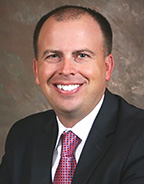 John Jungmann
John JungmannSpringfield School District
Career moves are part of the deal with school superintendents these days, and John Jungmann is well-versed with the moving drill. He’s was named super-intendent of the public school system in Springfield in March 2014, just two years after taking the leadership role in the Liberty district. And that, in turn, was just four years after taking the top spot in Monett. But at each stop, Jungmann has been able to expand his managerial horizons with a grasp of the challenges facing K-12 education across Missouri.
Springfield gets this Lamar native closer to his roots. “I was fortunate to grow up in a caring family where my parents were very supportive and modeled an incredible work ethic for all of us,” he says. His siblings were expected to finish high school, but college wasn’t mandatory, and he was the first to pursue a four-year degree. Inspired by teachers, coaches and a school principal, he made education his career choice, but he didn’t initially pursue administration until becoming convinced that he could affect the lives of more students from a leadership role than from the head of a classroom.
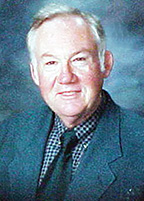 Bill Riggins
Bill RigginsWSR Consulting
Marshall
It’s a lifestyle that—thankfully—exists in few corners of Missouri today: No running water at home, a one-mile walk to the school bus and a 90-minute ride to classes, selling cream and eggs from the farm to pay for the flour, sugar, salt, coffee or tea that made up the in-town grocery list. Everything else they ate, they grew. That’s how Bill Riggins came to know farm life. Back then, corn yielding 40-50 bushels per acre was the norm; today’s technology and hybrid seeds yields six times that. Because he knew his parents couldn’t help, he went to college the hard way—on the GI Bill, and his path from Gentry County to the University of Missouri entailed a stop in Vietnam, as part of the 821st Material Supply unit. After his return and earning his degree, he worked for Eli Lilly and Baker Agri Sales in Sedalia, then started his own business in Brunswick, selling retail fertilizer, chemicals and custom-applications, and, seven years later, Riggins R-CO business, sells fertilizer and pesticide handling and application equipment in Missouri, Kansas and Okla-homa. Farming life today isn’t what it once was. “There have been,” he marvels, “so many advances.”
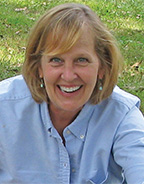 Sister Anne Francioni
Sister Anne FrancioniWhole Kids Outreach
Ellington
Some are Missourians by birth. For Sister Ann Francioni, it was quite literally a calling. First, to St. Louis, exploring a nursing career, then to a religious life in the School Sisters of Notre Dame. And finally, to her current role, the culmination of a lifelong interest in caring for children. This native of New Orleans was introduced to the sisters during a service project at a St. Louis boarding school. “The sisters were so passionate about what they were doing,” Francioni says, and that became her calling, too. During the formation process to become a nun, she was asked to go to Ellington and work in a domestic-violence shelter. The conditions in that part of southeast Missouri, the grinding poverty and the need made a lasting impression. When she was asked to start Whole Kids Outreach, modeled on a Saint Louis University School of Health program, she signed on. Now, one of her greatest challenges is finding the “miracle” donor to help make budget. “Every year, we have to raise $800,000; sometimes we know where from, many times we don’t,” she says. But experience has taught her that when there’s a need, a donor will come along.
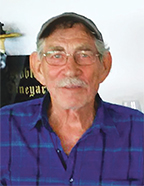 Bob Mueller
Bob MuellerRobller Vineyard
New Haven
Still not finished with a career in tool-and-die making, Bob Mueller was looking forward to more time on his hobby—wine-making—back in 1988. Turns out, the work was just getting started, because for the past 27 years, he’s been toiling on a hillside near New Haven, where the Robller Vineyard produces 15 varietals, from sweet to dry, white to red and about everything in between. It’s a hobby he picked up in 1965, he says. “My Dad helped me make some sweet Concord,” he says, “and this is the outcome.” He had dabbled in wine-making for years before making a trip to the Napa and Sonoma areas of California with his wife, Lois. “After that,” he confesses, “I got all excited.” They were researching retirement options at about the same time, and settled on an elevated site about a mile south of the river. “A friend told me, “If you’re going to do this, do it where there are other wineries,” Mueller recalls, “and what better place than near Hermann?” Today, they’re producing about 5,000 gallons a year, roughly 2,000 cases’ worth. His favorite? “Whatever bottle is open and suitable for dinner, I take down the hill,” he says.
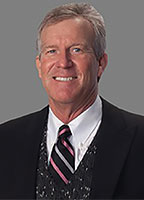 Bruce Twaddle
Bruce TwaddleCompass Dental Group
Maryville
One big difference between being a big-city dentist and practicing in a smaller town, Bruce Twaddle notes, is that you’re more likely to see your patients on the street. It’s an accountability factor, he says, because “your patients are your neighbors, your friends, your family.” That’s one of the reasons he returned home after finishing college at MU and earning his dental degree from UMKC in 1983, then launched his own practice.
“It’s a wonderful place to raise a family,” he says. “In many ways, the small community provides a great platform to impact a great number of people in a very positive way.” One way he’s done that is with the recent completion of the Tom Watson Junior Golf Course, which he says “is undoubtedly the defining community project of my life. We raised over $1 million in private funds in 18 months to build a junior golf course that will serve as a vehicle for children across the socioeconomic spectrum to find and embrace a lifetime sport.” That’s important, he says, because the game teaches not just golfing technique, but helps develop core moral values. Watson himself will come for the grand opening in May.
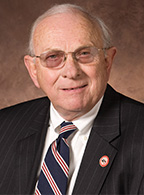 Bunky Wright
Bunky WrightLawyer
Columbia
Two things to know right away about Bunky Wright: First, the nickname is one his father drew from an old cartoon series. Second, he’s absolutely certain that the real capital of Missouri is not Jefferson City, but his hometown of Salisbury. “I always told people that—they just hadn’t discovered it, but some day, they would,” he says. People there—college-educated or not—were smart, Wright says, “and if anyone needed help, numerous people showed up to do it.”
That appreciation for service would underpin much of Wright’s career as a lawyer, primarily as general counsel for the University of Missouri (where he earned his law degree), as president of the Missouri Bar Association and the National Association of College and University Attorneys, as a member of the Missouri Higher Education Loan Authority Board, and as a member of the board of governors for the University of Central Missouri. What he hopes he’s left behind with that legacy of service, he says modestly, “is that somebody will feel like I did a competent job—that I helped those institutions and highered in general be realistic from time to time about what it was doing.”
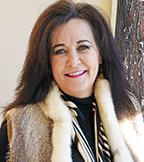 Lisa McKinzie
Lisa McKinzieMcKinzie & Co.
Osage Beach
She’s probably the only one of Missouri’s 6 million residents who has organized a tobacco-litigation settlement for one state, started an outdoor advertising company in another, sold it to a megabank and taken a residential realty company from scratch to No. 2 in market share. Wherever Lisa McKinzie goes, it seems, success follows. A native of Mississippi, she came to Missouri after working for the Supreme Court there, handling court administration of the national tobacco-company settlements in the 1990s. After moving here and marrying, she started the outdoor ad company, and fell in love with lake life.
Her most recent venture came after selling that company. Retirement wasn’t in her blood, so McKinzie jumped into residential realty in the heart of Missouri’s playground. That work led her to champion a new cause: a boot-camp program to help soldiers transition from military life into real-estate sales. “If they choose to get into this industry or an affiliate like mortgage lending or home building, we bring them in, do an assessment and make sure they get all the benefits they’re qualified for,” McKinzie says.
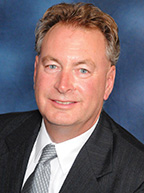 Ken Weymuth
Ken WeymuthW-K Chevrolet
Sedalia
If there’s a difference between running a successful vehicle dealership in a metro area and running one in a smaller community like Sedalia, it’s about the quality of relationships you have with customers. “I don’t think you need to modify your business plan just because the community is smaller,” says Ken Weymuth. “You just need to stick to it, and to take care of people the way they want to be treated.” That philosophy allowed this fourth-generation business, started by his grandfather, to fluidly make the move in 1999 from its roots in tiny Cole Camp to Sedalia, 20 miles north. “We found it easy when we moved because our family had such a good reputation,” Weymuth says. Sedalia “is a big enough location as far as population, yet small enough to go by your core values of small-town, friendly dealing.” His dealership sells Chevrolet, Cadillac, Buick and GMC models, and the company’s success is shared through various civic causes, particularly youth-related. “Most kids aren’t as fortunate to grow up like I did, and they need after-school attention,” Weymuth says. “It’s nice to be able to give back to help the youth of your community.”
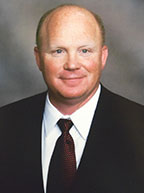 Phil Loyd
Phil LoydLoyd’s Electric
Branson
In business ownership or in community service, Phil Loyd says, “You have to enjoy what you do—and I do.” That has worked out well for Branson, where he served for 34 years on the board for a sheltered workshop, served as city alderman, and still serves on the zoning/planning board, the county airport board and, for more than 20 years now, the board of Cox Medical Center Branson, where he’s board chairman, and its predecessor, Skaggs Regional Medical Center.
Oh: There’s also the small matter of running one of southern Missouri’s biggest electrical-supply business, Loyd’s Electric Supply, plus two other family businesses.
He briefly left his boy-hood home after earning his degree from Drury University, and worked for about two years in St. Louis, but came back to the company his father started, where he now works with a third gener-ation. “I just realized,” he said of his path, “how much I missed Branson.” For a company to survive 55 years, he says, “you have to have a challenge within the business, embrace the business, and be willing to move with the times. We’re all resisient to change, but you have to be willing to do it.”
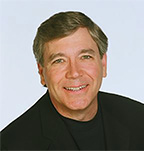 Greg Sullivan
Greg SullivanGlobal Velocity
St. Louis
Music’s loss would prove to be information technology’s gain, but Greg Sullivan hasn’t really strayed from his percussionist roots with Michael O’Roark and the Freeborn Men, a bluegrass show band. He’s laying down a successful beat as head of cyber-security firm Global Velocity. After a two-year fling with music, the northland Kansas City native earned a degree in information systems science and math at Washington University at the dawn of the personal computer age. He founded G.A. Sullivan, building custom software on Microsoft’s platforms, and over 22 years, built it into a 400-employee concern. He sold it in 2004, then launched Global Velocity. That seed, he says, has fallen on fertile ground. “As a region, we take a back seat to no one when comes to IT companies, and in particular, cyber-security companies,” he says. Our assets include state and private universities, large companies that work in that space, and a major Defense Department operations center at nearby Scott Air Force Base. All, he said, “give us the academic, industrial and federal presence” that distinguishes the St. Louis area’s IT capabilities.